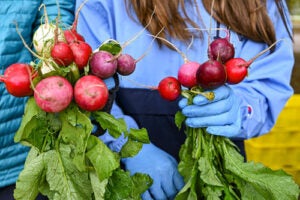Amanda Missimer and Vanessa Venturini, co-creators of Food Recovery for Rhode Island
First, some hard truths about food waste: In America, about 108 billion pounds of food, more than one-third of all available food, is thrown away annually. That’s 130 billion meals wasted and $408 billion squandered.
Also true: 34 million Americans live with hunger, according to the non-profit Feeding America. The Rhode Island Community Food Bank reports that during the pandemic, food insecurity—the state of not having access to balanced, nourishing, and diverse food—was at its highest level in 20 years in Rhode Island.
Food rotting in landfills creates greenhouse gasses. And then there are the less obvious societal ills food insecurity underscores, such as socioeconomic issues, health disparities, and institutional and structural bias.
“The pandemic really highlighted social justice and equity issues, especially when we talk about the food system,” says Vanessa Venturini ’08, M.S. ’11, URI Extension Coordinator.
The Food Recovery for Rhode Island program was the response of Venturini and Amanda Missimer, a clinical assistant professor in the Department of Nutrition and Food Sciences who also works with URI’s Cooperative Extension, an outreach program providing educational opportunities to the public.
‘Food recovery straddles waste and access’
“Amanda and I were in each other’s circles, and we would take these walks in the woods early in the pandemic, and ideas came to us about how to do things differently,” Venturini says. One idea was to create a course that would train people to be leaders in food recovery, keeping food waste out of landfills either by preserving, composting, or collecting and redistributing it. Tactics of food recovery might include helping a person plan before shopping at the grocery store, assisting them with budgeting, making use of leftovers, or preparing meals in advance.
“Food recovery straddles food waste reduction and food access,” Missimer says. “It benefits communities in that way. It can also benefit the individual in terms of improving a person’s nutrient intake, which is important in the prevention of chronic disease. Food recovery can help you stretch your dollars and ease the burden of making three meals a day.”
Both Venturini and Missimer say it is also very important that the outreach efforts URI makes in the community support existing community-led initiatives and programs. “You need to provide the education, share all the options, connect people to food recovery organizations, and then allow individuals to find what works for them long-term,” Missimer says.
“We have diverted 140,000 pounds of food from the landfill and over 60,000 pounds of food has gone to people instead of landfills.”Vanessa Venturini, ’08, M.S. ’11, URI Extension Coordinator and co-founder of Food Recovery for RI
How we move in the right direction
“What I want people to think about with food recovery is what benefits apply to them—food access, reducing waste, the environment, health,” Missimer adds. “And how can I implement one change? And then, what applies to my community, and how can I implement one change that way? If everybody could do that, we’d be moving in the right direction.”
With funding from the EPA, Venturini and Missimer created the six-week training program, “Train the Trainer,” by which people, individually and collectively, learn how to train others to contribute to reducing the amount of food waste sent to the landfill and increasing the amount of food that goes to people in need. They’ve partnered with URI experts and nonprofit organizations across the state that either influence policy-making or teach pickling and food preservation, composting, gleaning of fruits and vegetables, or transporting leftover food from restaurants for redistribution.
So far, 120 volunteers have been trained, and their efforts have yielded results both quantifiable and incalculable. “We have diverted 140,000 pounds of food from the landfill, and over 60,000 pounds of food has gone to people instead of landfills. The people we’ve attracted are average residents who want to do good in the world, who sat home during the pandemic feeling powerless,” Venturini says. “We’ve heard from people that they feel hopeful at seeing so many organizations doing good work. And it’s not just about what they’re doing in their homes but also what they’re seeing they can contribute to this larger effort in the community. Many of our partner organizations are collaborating in new and exciting ways.
“When you start making connections in a small place like Rhode Island, beautiful things can happen.”
Food Recovery for Rhode Island is a program of URI Cooperative Extension in partnership with the Rhode Island Food Policy Council, the Center for EcoTechnology, Earth Care Farm, Farm Fresh RI’s Hope’s Harvest, Groundwork Rhode Island’s Harvest Cycle, Rescuing Leftover Cuisine, Rhode Island Resource Recovery Corp., the Sankofa Initiative of the West Elmwood Housing Development Corporation, and the Tomaquag Museum.
— Marybeth Reilly-McGreen

